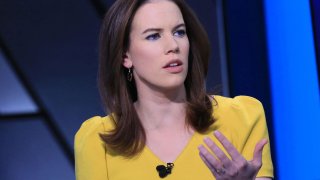
TOP OF MY MIND
I loved listening to David Einhorn's interview on "Halftime Report" yesterday, because Einhorn was quite candid about why he was even on TV.
We all remember him, of course, from his memorable short of Lehman Brothers in May 2008. His hedge funds posted stellar returns back in those years, but had a much rougher time post-financial crisis. And he wasn't the only one. The same anemic, Fed-supported recovery that gave rise to the "FANG" trade of the 2010s was the same that resulted in poor returns for a number of traditional, stock-picking "value" funds like Einhorn's.
Einhorn thinks that's now about to change. And that's why he's on TV. "When we were doing badly, I wasn't running around saying 'this is a great time to invest in what we're doing'," Einhorn told Scott Wapner (you can watch the whole thing here). "Right now, I think the wind is more at our back...we are performing well, and I think we're likely to continue."
Get New England news, weather forecasts and entertainment stories to your inbox. Sign up for NECN newsletters.
Now, people might scoff, because (a) no one believes in stock picking anymore, and (b) Einhorn has had a few tough calls in the recent past, including a Tesla short several years ago when he compared the company to Lehman, and missing the SunEdison fraud in 2015.
But Einhorn's point is that the knee-jerk--some would even say "lazy"--default to index investing isn't the sure thing anymore that everyone thinks it is.
"There was a really good theory from a long time ago that you can get the index return, you can save on taxes, you save on transaction costs; people got on board and a lot of money moved," Einhorn said about the rise of passive index mutual funds and ETFs. "It's not necessarily a bad thing, [but] it creates a lot of weirdness in the economy."
Money Report
"The [original] idea of passive investing is, well, you're a price taker; let everybody else figure out what the price is, and you just go along. [But] if all the money is going into passive, then passive funds become the price makers...and that actually becomes the dominant driver of performance," Einhorn said.
And yes, Einhorn is talking his own book, but let's not forget that the father of index investing, Jack Bogle himself, also expressed concerns before he died. "What if it becomes too successful for its own good?" he asked in an essay for The Wall Street Journal. His concerns were more that the index giants themselves--Vanguard, BlackRock, and State Street--are amassing "effective control" of the stock market and in turn having undue influence over corporate America, which could also undermine efficiency.
Defenders of index investing note that prices are still set by trading, which remains as efficient as ever a vehicle for price discovery. But Einhorn warns there are fewer investors doing the hard work to set prices for most of the stocks in the market today, as a result of the money--and analyst attention--that has flowed into index investing and mega-cap tech over the past decade.
"Most people either cannot do valuation, they choose not to do valuation, or their valuation is structurally agnostic," he said. "That leaves us, I don't want to say alone, but with less competition than 10 or 15 years ago." And the implication for the rest of us is that the market for many stocks may also be less efficient now than it was in the past.
Less efficient means a better shot at generating superior returns for those who do have a proven track record. Could we see a turn this decade back towards "star stock pickers," like Peter Lynch, who rose to stardom from 1977 to 1990? If there's one thing everyone seems to agree on lately--whether because of the Fed's tightening, the implosion of overly crowded tech trades, or inflation--it's that this is behaving like much more of a "stock picker's market."
See you at 1 p.m!
Kelly
Click HERE to sign up for this newsletter in one easy step.
To hear this as a podcast, subscribe to "The Exchange" and pick "From the desk of..."






